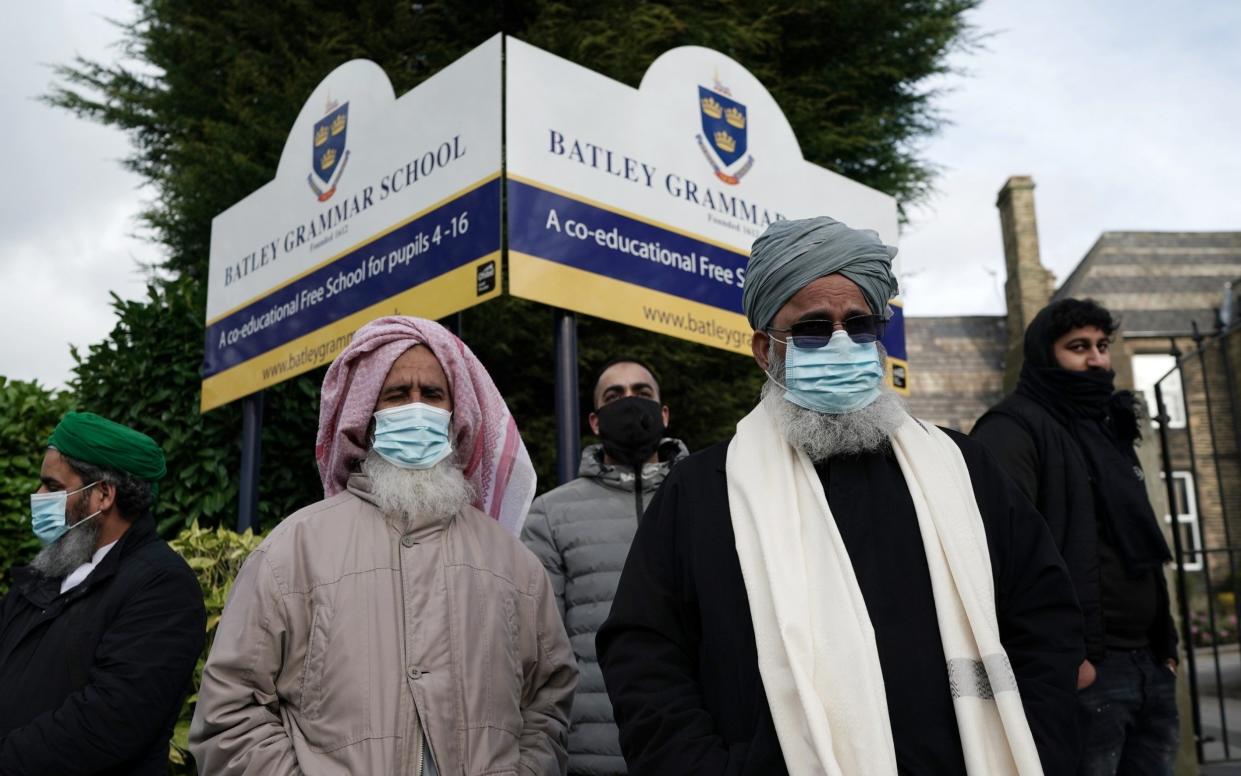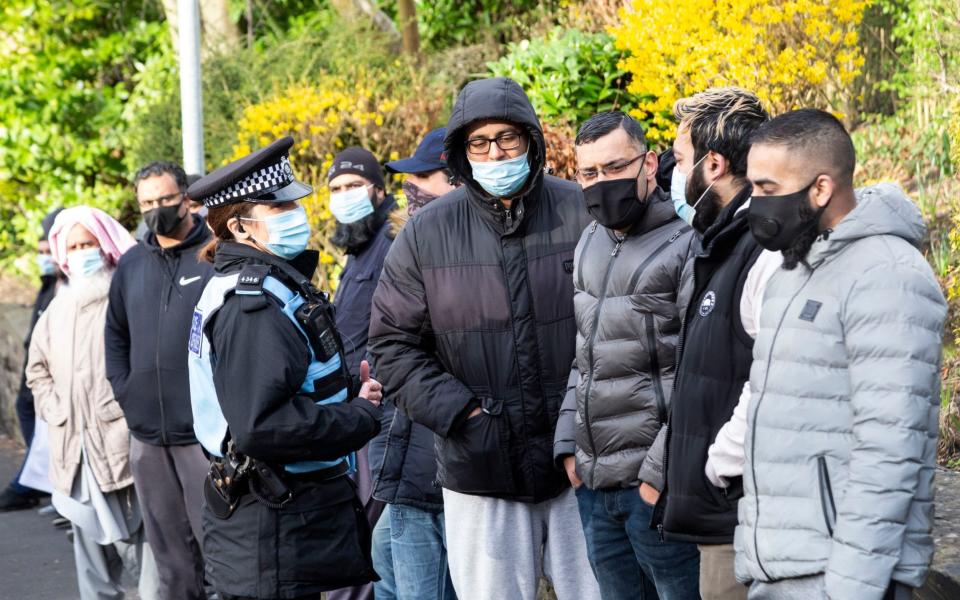Showing Prophet Mohammed images ‘should be as unacceptable as using n-word’

Showing images of the Prophet Mohammed should be as socially unacceptable as “using the ‘n-word’”, the Government’s Islamophobia advisor has said.
Imam Qari Asim MBE, chair of the Mosques and Imams National Advisory Board (MINAB), and the Government’s adviser on Islamophobia, called for a “change in social attitudes”.
His comments came as protestors continued to gather outside Batley Grammar School in West Yorkshire on Friday. They called for the teacher who showed a caricature of the Prophet Mohammed to pupils – and who is now reportedly in hiding – to be sacked.
Depictions of Mohammed are considered to be deeply offensive within Islam.
Speaking to The Telegraph, Imam Asim suggested that rather than impose statutory curbs on free speech, social “boundaries” which protect people from becoming offended should become the norm.
“I guess when we talk of a potential curb or limitation on free speech, I think that sets alarm bells ringing, leaving some people [wrongly] thinking that Muslims are asking for restrictions on free speech.
“But I think what we should try and emphasise is that there's already a phenomenon in place in that actually there are boundaries to free speech.
“Like, for instance, people cannot use the ‘n-word’ – and quite rightly so – because this is derogatory and causes deep pain and hurt.”
“I'm not in favour of restriction and curbing or free speech,” he said, “but I think we already have boundaries based on social norms. And therefore, how can we reach a mutual understanding of respect [in this regard too?]”
His comments come amid debate on social media as to whether the UK should resurrect blasphemy laws.
The common law offences of blasphemy and blasphemous libel were formally abolished in England and Wales in 2008 and in Scotland in 2021.
The controversial comedian, Ricky Gervais, was among those to share their opinion. He tweeted: “Blasphemy? F*****g Blasphemy? It's 2021 for f***’s sake. What next? People being punished for insulting unicorns?” His comment has been “liked” almost 40,000 times.
Imam Asim, who is the Imam at Leeds Mosque, also suggested that the Department for Education should bring in guidance or training to assist teachers with navigating this subject of blasphemy and depictions of the Prophet, without causing offence.
He added that Muslims are often negatively caricatured as “a turban with a bomb”, connoting stereotypes of Islamic extremism and terrorism and that more consideration of the “deep pain” they feel when the Prophet is depicted would help combat this.

“It is through education and understanding we bring about change in social attitudes so that derogatory images are not made/shared on the basis that they cause deep pain and hurt,” he said.
“For instance, on free speech, all UK newspapers in the past chose not to publish that image (having the right to do so), as it is a racist stereotype.”
In 2018, the European Court of Human Rights (ECHR) ruled that insulting Islam's Prophet Mohammed is not covered by freedom of expression.
It found that defaming the Prophet “goes beyond the permissible limits of an objective debate" and "could stir up prejudice and put at risk religious peace”.
Ahmed Shaheed, United Nations Special Rapporteur on Freedom of Religion or Belief added that states have much work to do in implementing anti-discrimination measures, protecting Muslims from violence and promoting their full and equitable socio-economic participation.
However, he added that “restrictions on freedom of expression are not to achieve these outcomes”.
“Anti-blasphemy laws are particularly counterproductive. They often result in de facto censure of all inter-religious or belief and intra-religious or belief dialogue, debate and criticism, most of which could be constructive, healthy and is needed.
“Moreover, blasphemy laws contribute not to producing better societal cohesion; they invariably lead to more tension and outright human rights violations, and in many contexts, to violence.”
Use our existing human right toolkit to address Islamophobia, not blasphemy laws
By Ahmed Shaheed

The recent use of cartoons depicting the Prophet Mohammad in the classroom context has again sparked controversy over freedom of expression and insult to religious sensibilities. For some, the incident provides an opportunity to call for censorship, while for others it is an opportunity to highlight illiberal positions taken by British Muslims. What is lost in this apparent clash is that freedom of expression is essential for democracy and pluralism but that it is also not an unlimited right.
Freedom of expression is indispensable to the enjoyment of all other rights, including for the enjoyment of freedom of thought, conscience and religion or belief – the right which I am mandated to promote. The manifestation of religion or belief relies on the degree of protection afforded to freedom of expression, among other rights.
Accordingly, where States infringe upon freedom of expression, freedom of religion or belief is undercut. This is not a novel view. The interrelatedness of the two rights has been widely recognized in international law, including by Human Rights Council resolution 16/18, the Rabat Plan of Action, my mandate and the UN Human Rights Committee.
While freedom of expressions is not an absolute right, any and all limitations must fully comply with the limitations regime prescribed under article 19(3) of the ICCPR. Article 19 further stresses that unlawful restrictions on freedom of expression frequently undermines freedom of religion or belief. Even where the intention of States may be to encourage civility and respect in public discourse and to protect minorities, laws that do not meet the test of legality and proportionality, deeply undermine the fundamental rights of all.
British Muslims face significant discrimination on the basis of their ethno-religious backgrounds in both the public and private spheres, including in employment, education and healthcare sectors. I documented as much in my report on Islamophobia/anti-Muslim hatred before the UN Human Rights Council earlier this month. My report also provides practical recommendations for various actors, including States, civil society and educators, to work with Muslims, rather than on Muslims, to address and mitigate the impacts of Islamophobia.
States have much work to do in implementing anti-discrimination measures, protecting Muslims from violence and promoting their full and equitable socio-economic participation. However, restrictions on freedom of expression are not to achieve these outcomes. Anti-blasphemy laws are particularly counterproductive. They often result in de facto censure of all inter-religious or belief and intra-religious or belief dialogue, debate and criticism, most of which could be constructive, healthy and is needed. Moreover, blasphemy laws contribute not to producing better societal cohesion; they invariably lead to more tension and outright human rights violations, and in many contexts, to violence.
Ahmed Shaheed, United Nations Special Rapporteur on Freedom of Religion or Belief

 Yahoo News
Yahoo News 
